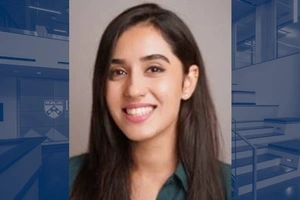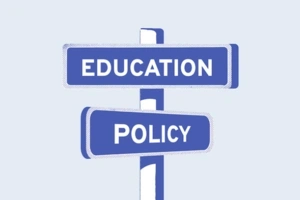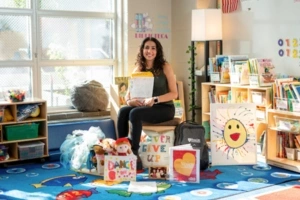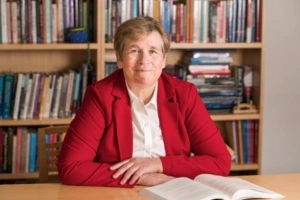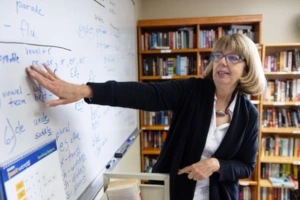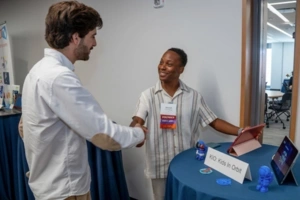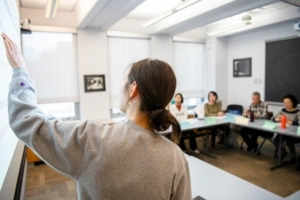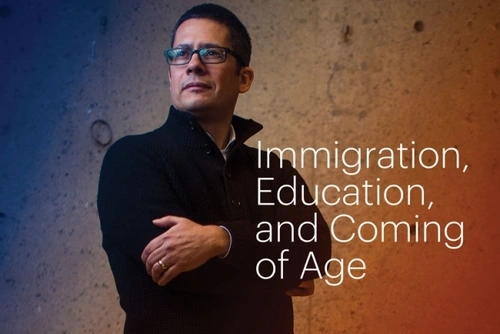
Photo by Adam Glanzman Photography
interview by Juliana Rosati
Penn GSE is welcoming Dr. Roberto Gonzales, a world-renowned scholar of the lives of immigrants in the United States, as the first Penn Integrates Knowledge (PIK) professor to hold an appointment at Penn GSE. Gonzales’s award-winning scholarship assesses how immigration policy shapes the ways that immigrant youth adapt, come of age, and experience life in their receiving countries. His work has been featured across leading scholarly and news publications and widely supported by foundations.
Selected for research and teaching that exemplify the integration of knowledge across disciplines, PIK professors hold appointments in more than one Penn school. Gonzales, formerly professor of education at Harvard Graduate School of Education, was named Penn’s 25th PIK University Professor effective July 1, 2021. As Richard Perry University Professor, he holds joint appointments in the Literacy, Culture, and International Education division of GSE and in the Department of Sociology of the School of Arts & Sciences.
We sat down with Gonzales to discuss the circumstances facing undocumented youth, the role of education in their lives, and how he plans to continue his research at Penn.
Your groundbreaking book, Lives in Limbo: Undocumented and Coming of Age in America (University of California Press, 2015), has won eight major book awards and been adopted as a common reading text by universities and school districts across the country. What was the genesis of the book?
Lives in Limbo was a labor of love, born out of what I perceived to be a problem of practice as a youth worker in Chicago in the 1990s. A very significant segment of the children and teenagers in our community were undocumented, and I saw the barriers they faced as they came of age. Their friends were reaching important milestones—taking after-school jobs, obtaining driver’s licenses, seeking financial aid for college, launching careers. And the undocumented youth were instead finding out that their undocumented status meant they couldn’t do these things. I say it was a problem of practice because a host of adults—teachers, counselors, youth workers, social workers, and healthcare professionals—were struggling to understand how to support this very significant demographic.
Several years later when I was in graduate school, I realized there weren’t really any studies about this population. I launched the project that became Lives in Limbo for my dissertation and spent twelve years studying 150 undocumented young adults in Los Angeles. I had no intention of carrying out the project for so many years, but due to the unpredictability of our immigration policy, every time I was ready to finish, there was a new policy development to consider.
Although education alone can’t remove the barriers that undocumented young people face, something that always comes back to me is how often my interviewees have told me they view education as something that can’t be taken away from them.”
Part of what Lives in Limbo illustrates is a trajectory in which undocumented young people have access to K–12 and even higher education, but without legal status they are unable to be hired for jobs that match their qualifications. How do you see the role of education in the lives of these young people, given the barriers they face as adults?

I’ve met so many K–12 teachers who have undocumented students in their classrooms, and they hold a very legitimate tension of wanting to do as much as they can for their students, but also understanding the limitations their students will face once they leave school. Many educators have asked, “Should I get their hopes up about preparing for a career, or should I have really tough conversations with them early on about a future that entails their working and living on the margins?” It’s a difficult question—essentially it’s about how to think ethically about one’s responsibility to one’s students. Although education alone can’t remove the barriers that undocumented young people face, something that always comes back to me is how often my interviewees have told me they view education as something that can’t be taken away from them. They’ve said very clearly that education is fundamentally important and one thing that really helps them stay motivated.
I’m working with some colleagues towards a set of best practices to help educators support undocumented students through our current study, “Educator Responses to Immigration Policies and Practices: Supporting Immigrant Students in a Changing Policy Environment,” funded by the William T. Grant Foundation. We’ve learned a lot about what districts are doing and how that varies by location. In more progressive regions we see that districts are able to support undocumented students very visibly, for example, by launching resource and support centers for students and their parents. In communities where there is very intense anti-immigrant sentiment, we see that educators still find ways to support immigrant students through much more subtle, but ongoing, acts of affirmation. This may involve resources provided by individual families rather than by the district as a whole.
The circumstances of many undocumented young people changed after the Deferred Action for Childhood Arrivals (DACA) program was created in 2012, offering temporary and renewable protection to young people brought to the United States as children. What did that mean for your research?
I was excited to be able to study in real time the impact of a policy that promotes integration and provides increased access to work authorization and deportation relief. With funding from the Gates Foundation and the MacArthur Foundation, I undertook a longitudinal research project, “From Undocumented to DACAmented: Understanding DACA Beneficiaries in a New Policy Context,” from 2013 to 2019. It was quite a transition for me as an ethnographer used to working on my own to begin managing a very large team of up to ninety-six people. We carried out a national survey of 2,864 DACA-eligible young people to understand their hopes and desires, as well as the short-term impact of DACA for those who benefited from it. Then we selected sites in Arizona, California, Georgia, New York, Illinois, and South Carolina to conduct in-depth qualitative interviews with 481 DACA-eligible young adults and learn how local legislation was shaping their experiences.
|“I’m looking forward to working with master’s and doctoral students and world-class faculty under the leadership of Dean Grossman at Penn GSE, as well as with the School’s Center for Urban Ethnography and its Ethnography in Education Research Forum.”
What did you learn about DACA’s impact, and how do you view the policy in light of legal developments that have made its future uncertain?
The success stories of DACA really prop up the importance of providing this population with increased access. From our work, we understand very clearly that young people who have obtained DACA have made gigantic strides; they’ve been able to get driver’s licenses, take jobs that match their education and credentials, launch themselves into lives with much more breathing room, and extend those benefits to their family members. I argue that it would not be hyperbole to call DACA the most successful policy of immigrant integration in the last two to three decades.
But DACA has shortcomings. As a policy that was not passed through legislation, it is susceptible to presidential and legal challenges. It also doesn’t provide a pathway to citizenship, address exclusions from federal financial aid, or provide relief to recipients’ family members and other loved ones. These limitations really underscore the need for a much more enduring and impactful policy that provides real membership to its beneficiaries and their families. I think we’re closer than we’ve ever been before to federal immigration reform, and the experience of DACA has shown us that education helps prepare recipients for the day when more doors open to them.
What are you looking forward to about your role at Penn and at GSE?
It’s an immense honor to join the community of esteemed scholars at Penn, and to be part of the University’s renowned PIK professors, and I’m thrilled to become the first PIK professor
at Penn GSE. I’m looking forward to working with master’s and doctoral students and world-class faculty under the leadership of Dean Grossman at Penn GSE, as well as with the School’s Center for Urban Ethnography and its Ethnography in Education Research Forum. I will teach immigration history, policy, and practice, and eventually a course on ethnography. I’ll also direct the Penn Migration Initiative, which will aim to train the next generation of immigration researchers and bring together scholars, policymakers, and practitioners to put research to use on the ground.
What’s next in terms of your research?
I have some resources to start a project about a Philadelphia community. I’m very interested in understanding Philadelphia’s diverse immigrant communities and learning about the important role of immigration in demographic change, as well as how those changes play out in schools and community organizations. As I have throughout my career, I want to spend a great deal of time gaining trust and establishing relationships before I begin. Much of how I carry myself as an academic is informed by my early experiences as a youth worker, and so it’s very important to me to learn collaboratively with community members and to ensure that the work can be used and shared in ways that are meaningful and important to them.
This article appeared in the Fall 2021 issue of The Penn GSE Magazine.
